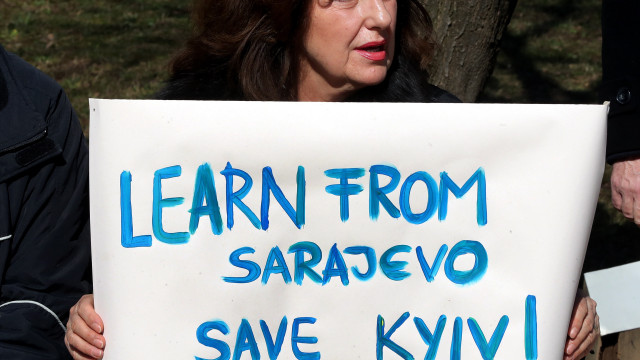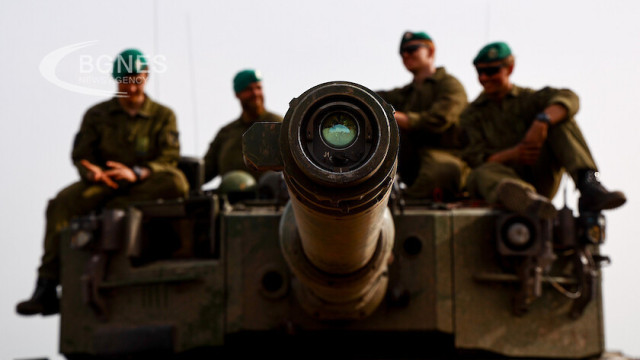This motto meets the eye when the reader opens this special book by Daniel Serwer called “From War to Peace in the Balkans, the Middle East, and Ukraine”.
Immediately after the preface and acknowledgments, there are words of praise, commencing with the ones of the Former US Secretary of State Madeleine Albright:
“Dan Serwer was there at the start of international interventions in the Balkans. He is a clear-eyed observer of what has worked and what has not in a region still at peace but still troubled. Dan has earned his observations from decades in the field, and this book is well worth reading.”
—Madeleine K. Albright, Former US Secretary of State, USA
After this notable beginning, this book aims and succeeds to a great degree to analyze the wars of Yugoslav succession after 1989 and subsequent peacebuilding of the 1990s and 2000s, up to the present. The author Daniel Sewer says he knows of no comparable effort. When a group of Fulbright scholars heading for the Balkans asked in the summer of 2014 for a book that gave an overview of the recent history, he was stumped. There is no single book to recommend about the conflicted parts of the region and their recovery from war, though as Daniel says “there are good books focused on the dissolution of former Yugoslavia and the postwar trajectories of individual countries”.
“This thin volume is a belated answer to the Fulbrighters’ request for an accessible treatment that treats the whole region’s recent wars and subsequent peace”, concludes the author.
The book began with lectures on Bosnia (I follow the usual American practice of shortening “Bosnia and Herzegovina”), Macedonia, Kosovo, Serbia, and the Balkans region as a part of Europe. I’ve added an introduction on “Why the Balkans?” and a concluding chapter on the implications for the Middle East and Ukraine, as people often try to apply lessons from the Balkans to those areas, which lie close by and share some history in the Ottoman empire.
“I have spent most of the last 15 years working on Iraq, Syria, Libya, Egypt, and other majority Arab countries suffering from conflict and experiencing often unsuccessful transitions from autocracy. I understand those who see in the ongoing tragedies in Ukraine and Syria multiple reflections of the 1990s conflicts, especially in Bosnia and Kosovo. But valid conclusions require we understand what is specific to the context and what is more generally applicable.” Continues Daniel.
Further on in the book, Daniel speculates that “The Balkans are on no one’s list of priority areas to study these days. Nothing I say here will change that, but the difficult process, serious barriers, and relatively positive outcomes of international peace- and state-building interventions in the Balkans can shed light on challenges we face in other parts of the world and suggest ways to deal with them”, stresses the author and charts a way to deal with conflicts in other parts of the world, drawing ideas to deal with dire times and times of turmoil from the Balkans:
“The extraordinarily costly, highly militarized, and miserably unhappy, if not yet quite failed, interventions in Iraq and Afghanistan should not be the only ones that inform thinking about how to go about enabling people in conflicted societies to secure, govern, and prosper themselves. Nor should setbacks in the Balkans since 2008, after serious progress in the previous decade, make us abandon hope that the region can remain at peace. In an era when security gaps, governance failures, creeping autocracy, and social and economic exclusion are creating fertile ground for extremism, it behooves us to contemplate what has been achieved in the Balkans, even if the outcomes are less salubrious than many of us would like.”
As to history, the bitterness can be sensed in the tone of the author:
“It is troubling that much of the Balkans story is forgotten, or mistakenly remembered as the outcome of deeply ingrained and seemingly interminable ancient hatreds. Many otherwise well-informed people know little or nothing about the wars that accompanied the dissolution of Socialist Yugoslavia unless they are among the relatively few who have served there. They are puzzled as to why the United States intervened militarily in Bosnia and Kosovo. News headlines from the Balkans that focus on tales of woe discourage deeper inquiry. My colleagues at the State Department, in European foreign ministries, and in academia on both continents doubt much has been achieved. Some even deem the 1990s interventions a miserable failure. They rightly complain about corruption and abuse of power, state capture, autocratic tendencies, lack of accountability for war crimes and human rights abuses, persistent ethnic tensions, youth unemployment, lagging economic growth, growing extremism, and constraints on freedom of the press. All those ills plague the Balkans today.”
Daniel P. Serwer is a professor of Practice of Conflict Management as well as director of the Conflict Management and American Foreign Policy programs at the Johns Hopkins School of Advanced International Studies. Serwer is also a research scholar at the Middle East Institute in Washington D.C.
Serwer served as a minister-counselor with the U.S. Department of State. He was deputy chief of mission and chargé d'affaires at US Embassy Rome from 1990 to 1993 and from 1994 to 1996, special envoy and coordinator for Bosnia and Herzegovina. During this posting, Serwer mediated to end the brief Croat–Bosniak War in 1994 and negotiated the first agreement reached at the 1995 Dayton peace talks. /BGNES







